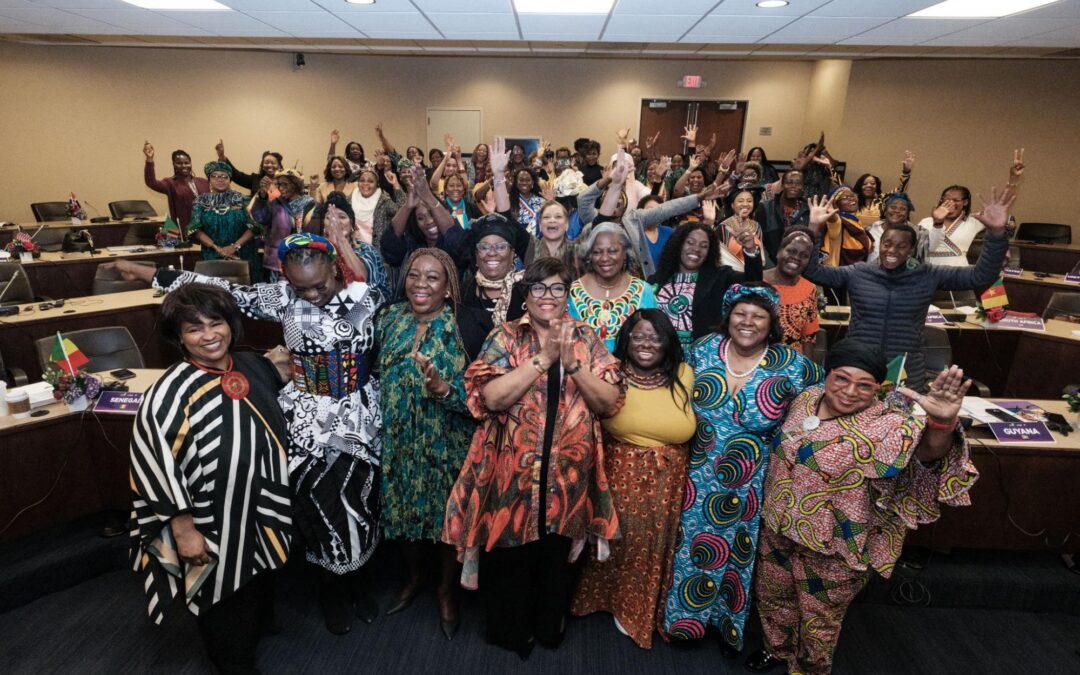
Mar 26, 2024
Black women across the world are experiencing the same issues–despite borders, distances and cultural backgrounds–and the best way to face those challenges are solidarity, coalition building and convening organizations, say Solidarity Center partners who joined the recent Black Women’s Roundtable‘s (BWR) 13th Annual “Women of Power” Summit in Washington, D.C. The 26 international participants, all of them Black women labor leaders from 14 countries in Africa and the Americas, joined the summit for a day focused on international issues.

Solidarity Center partners at the U.S. Capitol. Credit: Terrance Heath/Solidarity Center
“Our issues are the same. It’s just the faces and the locations that differ. And when we get together, that is when something great is going to happen,” said Bashiratu Kamal, gender equality officer with the General Agricultural Workers Union in Ghana, who spoke on a panel during the summit’s Global Empowerment Day.

The rally. Credit: Verolyne Banard/Solidarity Center
Global Empowerment Day featured high-profile panelists including Ambassador Hilda Suka Mafudze, African Union ambassador to the United States; Jamila Thompson, senior adviser to the U. S. Trade Representative; and Carolina Wanga, president and CEO of Essence Magazine.
During the day’s discussions, punctuated by laughter, chants and even a spontaneous song, participants called attention to the problems women in their respective communities are facing, such as gender-based violence and harassment (GBVH) and the treatment of workers in the care economy. The lack of women’s representation in decision-making processes, they noted, is all the more important because this year 4 billion people are going to the polls in national elections.
“It is very important that women have power in a democratic society. We have said and reaffirmed that, and we are convinced that democracy without women is incomplete and that society today is demanding us to be in power decisions,” said Delys Puerta Arellano, treasurer of the Single Union of Education Workers of Bolívar, in Colombia.

Black women labor leaders met at the Solidarity Center office for a leadership meeting in preparation for BWR Global Day. Credit: Terrance Heath/Solidarity Center
Participants also celebrated the strides their home countries have made for women’s rights. Zingiswa Losi, the first female president of the Congress of South African Trade Unions (COSATU), highlighted South Africa’s efforts, including the passage of ILO Convention 190, the establishment of a minimum wage, the South African Constitutional Court ruling granting workers’ compensation to domestic workers and progressive policies on parental leave. She said she was looking forward to taking other ideas, learned at the summit, home to further advance women’s and worker rights.

Credit: Bill Lee/Black Women’s Roundtable
The Solidarity Center has long been a champion for women’s rights, both in and out of the workplace, and has partnered with many women’s rights organizations around the world, including BWR, according to Sarah McKenzie, Solidarity Center program strategy and innovation director. McKenzie serves as co-chair of BWR’s Global Empowerment Working Group and connects Black women labor leaders from Africa and the African diaspora to BWR. She also helped launch the East African Women’s Roundtable in November 2023.

A discussion of working conditions for sugarcane workers in the Dominican Republic and how Dominicans of Haitian decent are treated there. Credit: Bill Lee/Black Women’s Roundtable
“Creating a space for these amazing leaders to come together is important because they are able to bring their wealth of knowledge to come up with solutions, provide support and build coalitions, not only just for one another, but also for other Black women and labor leaders in the United States and broader civil society,” said McKenzie.
Added McKenzie: “This summit is not just a one and done thing. The Solidarity Center is supporting these women to build out country coalitions and organize around the issues that were discussed at the summit. These women will be working closely together cross-regionally to develop advocacy plans aligned with global strategy and key priorities.”

Credit: Bill Lee/Black Women’s Roundtable

Credit: Bill Lee/Black Women’s Roundtable
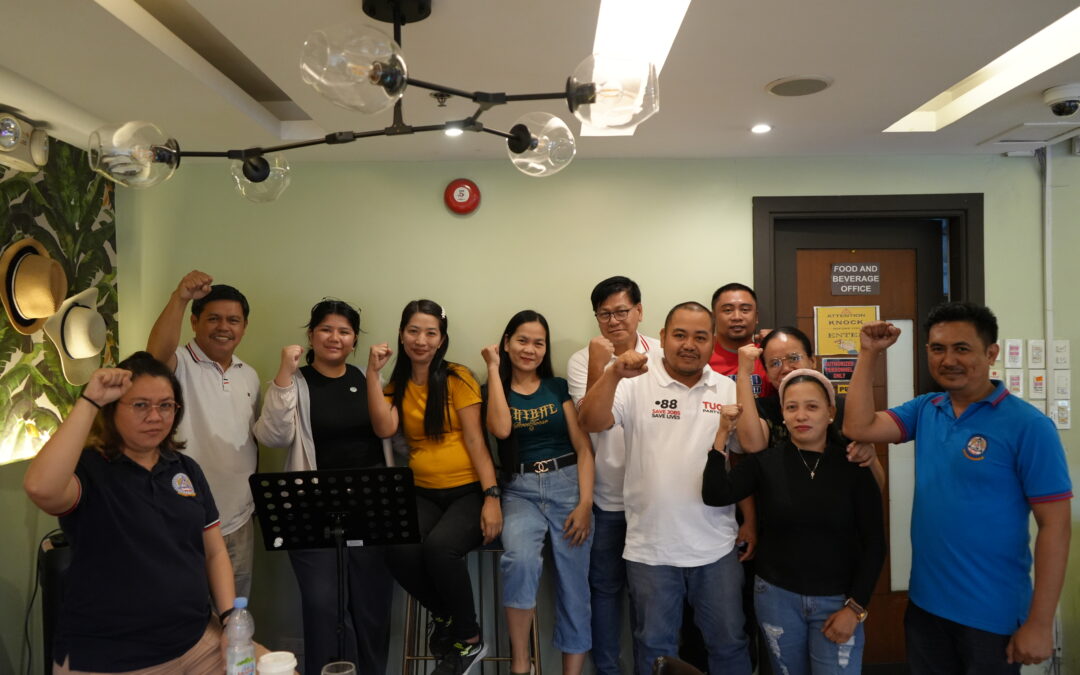
Mar 20, 2024
In the latest effort by a Philippines luxury bag manufacturer to break a nascent union, nearly 1,000 workers were forced to take leave from January until March, denying them three months wages. This is the second round of forced leave imposed at the 3,000-worker facility in recent months, and one more action by the company to dishearten organized workers.
In September, soon after the D’Luxe Bags Union won the election to represent workers at the factory, Patricio Tago, then union vice president, was abducted and imprisoned on false drug charges. The company has threatened to close the factory and transfer operations to a sister plant in the neighboring province. And workers face intimidation and increasingly difficult working conditions.
The Philippines is ranked as one of the 10 worst countries for working people by the International Trade Union Confederation, specifically for violence against and arrest of trade unionists, and union busting.
Union leaders are fighting to end the forced leave and to secure a strong collective bargaining agreement with D’Luxe Bags–which produces women’s bags for luxury brands like Coach and Michael Kors. The factory is owned by Luen Thai Holdings Ltd., a Hong Kong-based manufacturing and investment company.
Union President Angel Soliven said workplace conditions have declined since the union victory in September, and forced leave continues to occur despite quotas. While intimidation tactics often target union leaders directly, worsening work conditions affect everyone.
“They’ve been taking away our incentives in increments,” says Soliven. “We used to get 2,000 pesos (about $36) monthly before 2019, but now we only receive 5 pesos (about 9 cents) at the most.”
A lot of the workers depend on incentive pay to supplement their income, as the provincial minimum wage is only 10,000 pesos (about $180) per month.
“We also have to reach a target quota of 130 to 180 bags per day, and they threaten us with forced leave if we don’t meet that,” she says.
Despite the challenges, the union is determined to stand strong.
“We keep fighting so that we get to work in better conditions,” Soliven says.
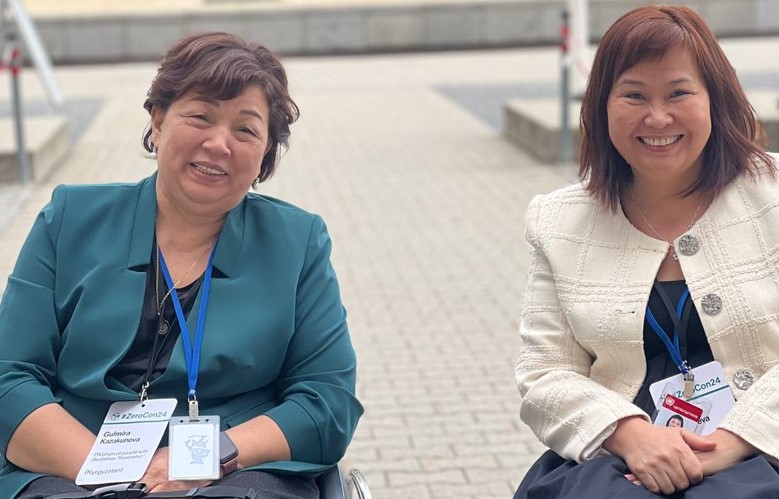
Mar 18, 2024
More than 1 billion people, or 16 percent of the world’s population, experience a significant disability, and 80 percent to 90 percent of working age people with disabilities are unemployed in developing countries. People with disabilities are more likely to experience adverse socioeconomic outcomes than those without disabilities, such as under education, a higher drop-out rate, lower levels of professional integration and higher poverty levels.
In Central Asia, the Solidarity Center partners with disability rights groups to promote inclusive employment, including through inclusive education. Zakhira Begalieva and Gulmira Kazakunova, disability rights activists who head Kazakhstan’s I Teach Me and Kyrgyzstan’s Ravenstvo, respectively, last month joined more than 1,000 people from 100 countries in Vienna for the UN’s 2024 Project Zero Conference to learn more about Inclusive education and information and communication technology (ICT), and to explore regional and global alliance-building opportunities.
“Here you feel some kind of freedom and you feel that opportunities are not limited,” said Kazakunova.
In Kazakhstan, I Teach Me provides online training for youth with disabilities to prepare them for future employment and, in Kyrgyzstan, Ravenstvo educates women with disabilities to help them secure jobs and advocates for inclusive education to help increase job market participation for women with disabilities.
The UN Convention on the Rights of Persons with Disabilities (CRPD), which aims to create conditions for persons with disabilities to participate in society on an equal basis with others and free from discrimination, was ratified by Kazakhstan in 2015 and Kyrgyzstan in 2019. However, discrimination against people with disabilities has persisted.
In Kazakhstan, the UN Development Program (UNDP) reports that the country’s more than 750,000 people with disabilities every day, “face obstacles on the way to gaining equal access to education, health and employment.” The Solidarity Center in Kazakhstan is supporting partners who, after years of advocating for inclusivity, are now focused on implementation of new legislative measures and a legal framework adopted to ensure implementation of CRPD. Starting this year, more than 34,000 workers with disabilities were covered by measures to promote employment.
In Kyrgyzstan, the Solidarity Center is supporting a program focused on reducing discrimination in employment and promoting the labor rights of workers with disabilities—the first of its kind in the country. A 2022 Solidarity Center study revealed that only 20 percent of people with disabilities surveyed in Kyrgyzstan were employed, most in insecure seasonal or part-time jobs. Through a combination of legislative analysis, large-scale media campaigns, the development of a mobile application, individual legal support, educational trainings and collaboration with key organizations, the Solidarity Center is working to make real change for people with disabilities in Kyrgyzstan, including efforts to harmonize regulations and mechanisms in the country’s labor code to improve laws impacting people with disabilities.
Unions and other worker associations can be especially effective advocates for disability rights. The International Labor Organization (ILO) reports that unions are the strongest voices advocating for the rights of people with disabilities at work around the world. Public-sector unions, where survey data shows workers with disabilities experience higher levels of union representation, are natural organizers around rights issues because of their position at the nexus of governance and work.
Learn more about strategies that civil society allies in Kyrgyzstan, with Solidarity Center support, are using to advance and protect the rights of people with disabilities—including coalition-building and joint advocacy projects with national and local disability rights organizations, pro-bono legal support, data collection, legislative reform and trainings-of-trainers with disabilities. [Video in Russian]
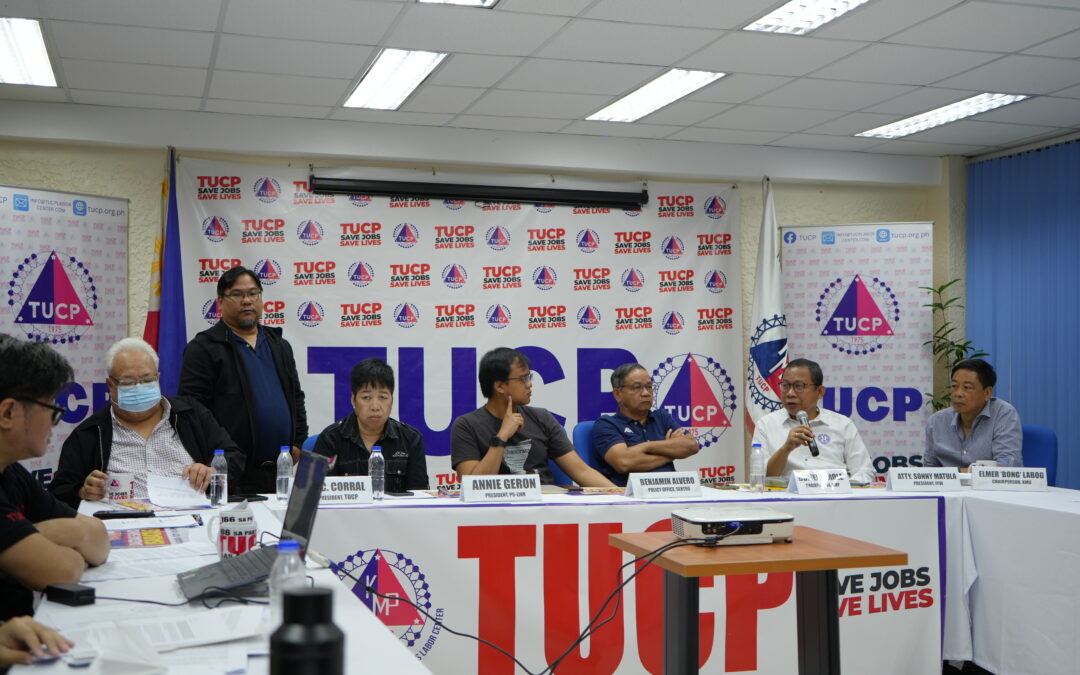
Mar 15, 2024
Philippine trade union leaders are calling for an across-the-board daily minimum wage increase in the private sector to alleviate the economic burden workers currently face.
House Bill No. 7871 calls for a wage hike of 150 PHP (approximately 3 US dollars). Amid high inflation, poor job quality and a lack of new and decent jobs, supporters argue that immediately passing and enacting the wage increase is critical to support workers’ economic recovery.
During a press conference in Quezon City on Thursday, Benjamin Alvero, chief policy officer of the Center of United and Progressive Workers (SENTRO) said, “This wage hike is not just a matter of economic development but also of social justice. The wage hike that we currently have at the regional level is just to catch up with inflation, and that is not enough.”
“There is an urgency to pass this legislated wage hike as the first step in the right direction towards addressing the disparity between the family living wage standard and current minimum wage rates,” Philippine Labor representatives said in a joint statement.
Last month, the Philippine Senate approved a minimum wage increase–the first Congress-legislated wage hike since 1989—of 100 PHP (roughly 2 US dollars).
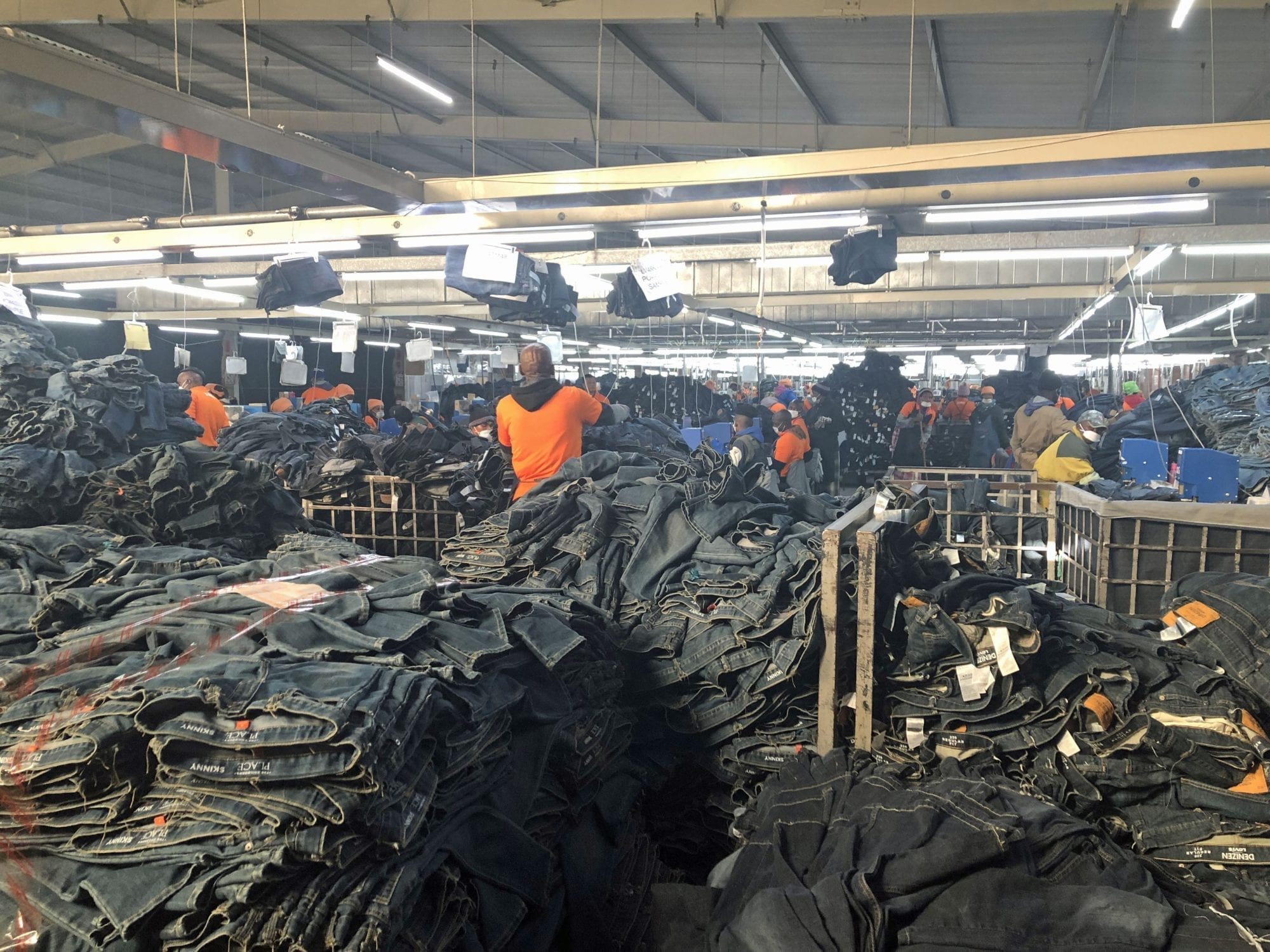
Mar 7, 2024
When workers can “speak up, articulate and manifest collective agency that ultimately improves the terms and conditions of their employment and their livelihoods,” they also have a role in shaping their societies and “contributing to democratic participation beyond the workplace,” says a new report released today by the U.S. Department of Labor’s Bureau of International Labor Affairs (ILAB).
“Worker Voice: What it is, What it is Not, and Why it Matters,” was produced by Penn State University’s Center for Global Workers’ Rights (CGWR).
“The term ‘worker voice’ is used for lots of scenarios where workers have some sort of participation but not necessarily a say in issues that affect their lives and livelihoods,” said Solidarity Center Executive Director Shawna Bader-Blau. “If you care about democracy and worker rights, this is the seminal report.”
For example, corporate social responsibility programs that interview workers on site, under the helpful gaze of management, may provide a public relations boost to the company but do not capture worker voice; indeed, they often contribute to wage suppression and gloss over lax safety standards. Likewise, workplace suggestion boxes, which require zero response from management, neither provide workers with a voice nor help them ensure dignity and equity on the job.
“The most effective forms of worker voice are institutions and mechanisms that enhance workers’ ability to elect, represent, protect, include, enable and empower workers and their organizations,” according to the report, which highlighted democratic trade unions and collective bargaining as key.
Legitimate and effective channels for worker voice exist and include enforceable brand agreements (EBAs), such as the Accord on Fire and Building Safety in Bangladesh, which identified and remediated 97,235 high-risk fire, structural and electrical safety violations following the deadly collapse of Rana Plaza. In Lesotho, where brand-led, voluntary codes of conduct failed to address rampant gender-based violence and harassment, binding and enforceable agreements among unions, civil society, international clothing brands and worker rights organizations (including the Solidarity Center) and Nien Hsing, a garment manufacturer, are changing attitudes, protecting workers and helping to end violence and harassment on the job.
In addition, the report cites the Rapid Response Labor Mechanism, under the United States-Mexico-Canada Agreement (USMCA), which has provided expedited enforcement of freedom of association and collective bargaining rights at factories in Mexico for more than 30,000 workers. Other channels include organizing along migration corridors and among domestic and farm workers; and freedom of association protocols.
The report describes six components that are crucial for effective worker voice: election of representatives; representation of members; diversity in leadership, on committees and throughout organizations; protection of workers from anti-union discrimination, harassment, threats and violence; the enabling of worker organizations to carry out functions by ensuring members have time, space, information and training; empowerment of workers and their organizations to engage in protected trade union activities, including collective bargaining and strikes, by leveraging state and private mechanisms that have sanction power on employers.
The report’s case studies include many countries and sectors where the Solidarity Center has long-term partnerships with unions that provide effective worker voice, among them, Bangladesh, Honduras, Lesotho, Mexico and Myanmar.
Recognizing the importance of democratic freedoms in securing effective worker voice, the Solidarity Center has long partnered with unions fighting for their right to democratic freedoms, including freedom of association and of assembly. These efforts include the historic 2023 Zambia Summit for Democracy, where participating unions and governments shared strategies on how unions can advance democracy through one of its most essential components—worker rights—and Solidarity Center support for union partners fighting for their rights in Bahrain, the Philippines, Swaziland and Tunisia.
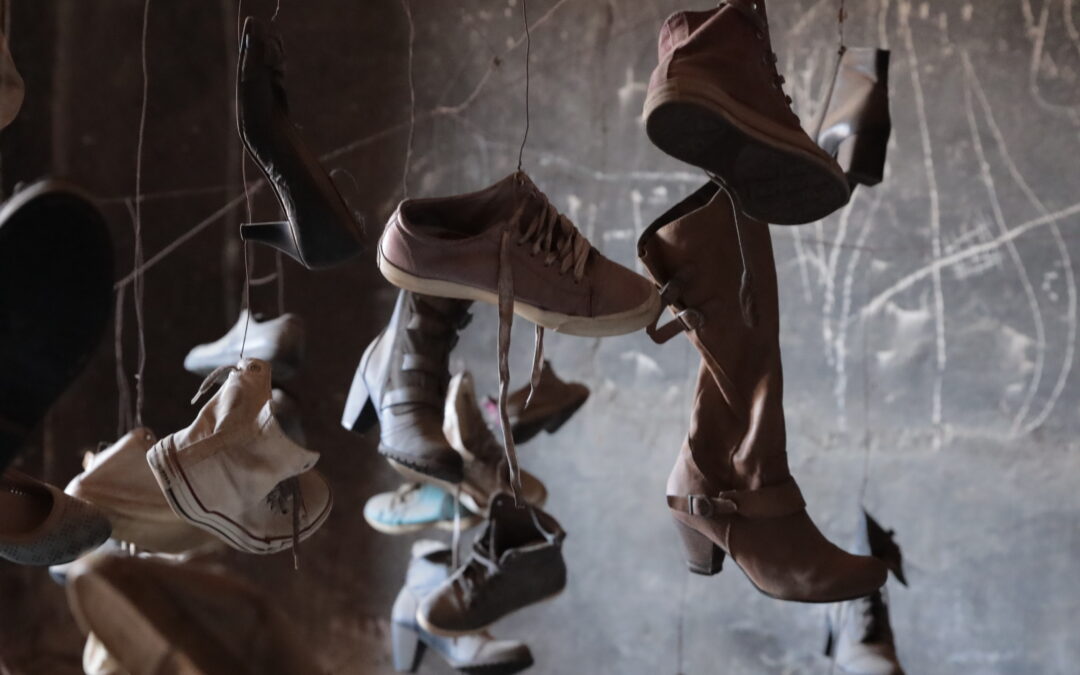
Mar 5, 2024
Kosovo teachers’ union SBASHK (United Union of Education, Science and Culture of Kosovo) is forging a shared school-family-community-policymakers’ agenda to build a multi-tiered mental health support system. This successful effort includes hosting a national conference last month during which attendees agreed to collaborate on solutions going forward and the Ministry of Education committed to increasing the number of school psychologists, addressing national mental health legislation and supporting national mental health awareness campaigns.
The conference—which brought together more than 80 representatives of Kosovo education unions and other union and civil society organizations, education, healthcare, government, the Kosovo Parliament, media, academia, students and parents’ councils—sought to destigmatize discussion of mental health; examined the latest research and best practices on mental health promotion, prevention and intervention for students, teachers and families; and facilitated opportunities for parents, policymakers, school administrators and teachers to work together on solutions.
“Mental health in Kosovar society is intertwined with a series of factors such as transgenerational trauma from the [1990s Kosovo] war, low salaries that make it difficult to meet vital needs, high unemployment rates, unsafe environments—including cases of sexual assaults—and poor-quality education,” Member of Parliament and University of Pristina Psychology Professor Fitim Uka told conference attendees.
During panel discussions, workshops and breakout sessions, roadblocks to mental health improvement in schools were identified, resulting in a joint appeal for more psychologists in schools, teacher and psychologist training programs, better teacher working conditions, specialized service referrals and advocacy campaigns for reducing mental health stigma, and, above all, for stakeholders to work together.
“This conference proves that, together, we can help for the good of a school and for an even better education,” said SBASHK Chairperson Rrahman Jasharaj.
Solidarity Center Executive Director Shawna Bader-Blau, who also presented, reinforced the call for a shared school, family, community and policymakers’ agenda.
“We’re all in this together, to help our children succeed and help our schools succeed,” she said.
During the 1998-1999 Kosovo war, SBASHK played a vital role in preserving education services. Today SBASHK advocates for better working conditions and fair salaries, safer schools and professional growth opportunities for teachers. A five-week 2022 teachers’ strike for a living wage in response to COVID pandemic and Ukraine war-related inflation earned teachers a significant salary increase, but regional economic challenges continue to threaten teachers’ well-being.
The February 21 and 22 Pristina conference, supported by the Solidarity Center, united stakeholders dedicated to enhancing mental health support in schools including SBASHK, the Ministry of Education, Science, Technology and Innovation (MESTI), the Ministry of Health (MoH), the Parliamentary Committee on Education, the Union of Independent Trade Unions of Kosovo (BSPK), the European Trade Union Committee for Education (ETUCE), Slovenia Education Union (SVIZ), the Education Unions of Albania (SPASH and FSASH), Union of Education, Science and Culture North Macedonia (SONK), the Association of Municipalities, the Municipal Directorate of Education (MDE), the Council of Parents (KP), the Council of Youth (KYC), the Chamber of Doctors, the Chamber of Nurses, the Department of the Psychology/University of Pristina (DP), Kosovo Education Center (KEC), the Kosovo EdGuard Institute and the Kosovo Association of Independent Journalists (AGK).













